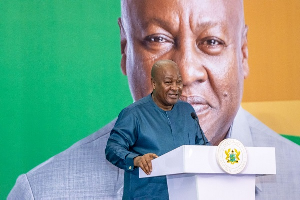The ruling New Patriotic Party (NPP) will continue to improve on the institutional and legislative reforms to strengthen the capacity of governance and anti-corruption institutions to deter, detect, and prosecute corrupt officials if it wins the December polls.
“Our next four years will continue to pursue reforms to strengthen governance institutions, including; local government and anti-corruption institutions,” NPP stated in its Election 2020 Manifesto under the sub-headline: “Consolidating Our Achievements and The Way Forward – Governance”.
The NPP said the government under President Nana Addo Dankwa Akufo-Addo, and Vice President Dr Mahamudu Bawumia “will continue to improve the financing of governance and anti-corruption institutions like the Ministry of Justice.
“The Office of the Attorney General, Office of the Special Prosecutor, Office of the Auditor-General, NCCE, CHRAJ, and EOCO, would be empowered to enable them to recruit, continue to train, and retain dedicated staff to support the fight against corruption.
“It will provide resources for the Right to Information Commission to operationalise effectively the RTI Law, enact and implement the Broadcasting Bill in accordance with the Constitution.
“It will implement the Media Capacity Enhancement Programme and intensify the implementation of key programmes in the sector, and assist the National Media Commission”.
Recounting what it had achieved over the past four years in government, in specific reference to Governance, Corruption, and Public Accountability; the NPP said it strengthened the legal framework to fight corruption.
It has passed into law the Witness Protection Act, 2018 (Act 959); The Office of the Special Prosecutor Act, 2018 (Act 959); Corporate Restructuring and Insolvency Act, 2020 (Act 1015); and Public Financial Management Regulations, 2019 (LI2378).
The NPP over the past four years also passed the RTI Act, 2019 (Act 989); and the Companies Act, 2019, (Act 992), which provides a framework for establishing a beneficial ownership register.
The NPP said it also implemented several digitisation initiatives to prevent public-sector corruption, and applied Open and Competitive Bidding, and conducted Ghana’s first open bidding round for oil blocks and established a National Register of Contracts/Register of Petroleum Agreements, as provided for by the Petroleum (Exploration and Production) Act, 2016 (Act 919).
It said through the vigilance of the NPP government more than 40 high profile persons were charged with various acts arising out of actions and activities superintended by the Mahama-led NDC administration, involving in monetary terms a total of about US$265.5 million and GH¢2.225 billion.
“To date, six have been found guilty, three of whom have been jailed and ordered to refund US$3 million to the state. The other three have been ordered to refund GH¢18.5 million and forfeit assets, including; eight buildings and five luxurious vehicles to the state.
The NPP said: “We have broadened and extended the People’s Assembly concept into a Town Hall Meetings, which have been addressed by the Vice President, Sector Ministers, Ministers of State, Regional Ministers and MMDCEs.
It has initiated the parliamentary process to amend the law to provide for public disclosure of asset declarations which is part of the Public Officials Code of Conduct Bill currently before Parliament.
The NPP explained that the Public Officials Code of Conduct Bill, will, among other acts, empower the National Road Safety Commission (NRSC) to enforce and sanction road sector operators.
“Cabinet has approved the conversion of the NRSC into an Authority with the necessary powers to enforce and sanction operators in the sector.
The NPP government also ensured strict enforcement of the Public Procurement Act through the implementation of the e-Procurement platform and the “Common User Average Price List.”
The National Procurement Authority (NPA) is ensuring compliance with the Procurement Act. The government has also resourced the Auditor General’s Office to set up a Procurement Audit Unit to conduct Value-For-Money audits.
It said budgetary allocation to the Office of the Auditor-General has been significantly increased to enable it to perform its duties. Other anti-corruption and governance institutions were resourced.
“We have improved the financing of governance and anti-corruption; increased the direct transfers of District Assembly Common Fund (DACF) funds to MMDAs.
“We have significantly increased the direct transfers of DACF funds to MMDAs from 35.1 per cent in 2016 to 53.40 per cent in 2019 in fulfilment of our commitment to curtail centralised spending on behalf of local government structures and establish a Transaction Price Database to track typical project costs”.
Politics of Monday, 2 November 2020
Source: GNA













